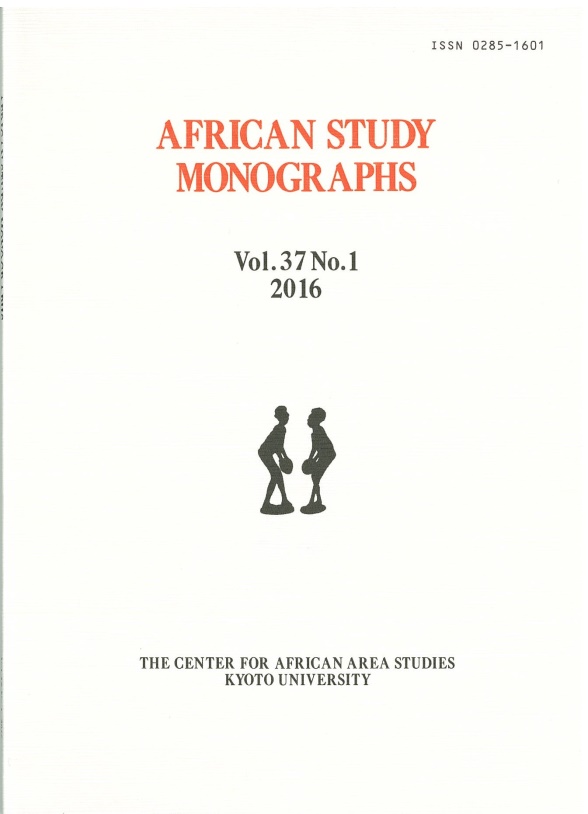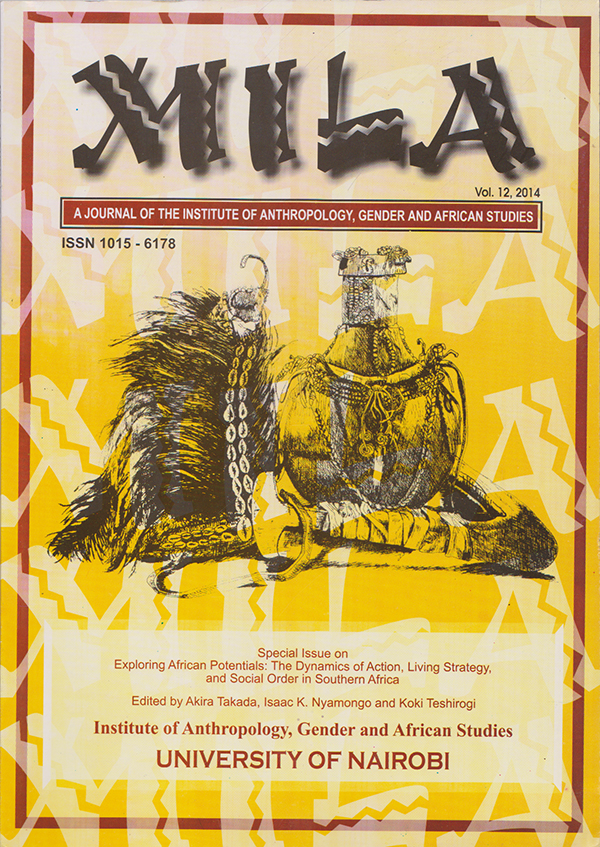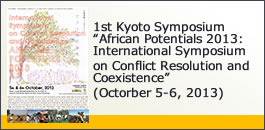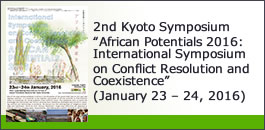Date: November 8, 2014. 14:00-17:30
Venue: Middle-sized Meeting Room, Inamori Foundation Memorial Building, Kyoto University
Program
14:00-14:10 Misa Hirano-Nomoto (Kyoto University)
“Statement of purpose: For the Forum in Yaounde”
14:10-14:35 Hisashi Matsumoto (Yokohama National University)
“Immigrants and Chieftaincy Titles: African Potential and Traditional Authority”
14:35-15:00 Hidetoshi Kondo (Kansai University of Foreign Studies)
“Enchanted Transition of Relations: Reconsidering the Conflict Relationship in Witchcraft Research in Africa”
15:00-15:25 Takao Shimizu (Research Institute for Humanity and Nature)
“Non-resistant Acts for the Survival of Marginalized Muslims: Reproduction of Muslims in Burkina Faso”
15:25-15:40 Coffee/Tea Break
15:40-16:05 Hideyuki Okano (Osaka University)
“Public Authorization of the Informal Sector: Case Study of the Motorcycle Taxi Industry in Post-conflict Sierra Leone”
16:05-16:30 Takanori Oishi (Research Institute for Humanity and Nature)
“Conflicts Over Land in the Recent Cacao Production Expansion Process in South-Eastern Cameroon: Inter-ethnic Negotiation and Cultural Propagation in a Multi-ethnic Setting”
16:30-17:30 General Discussion
Report
“Statement of purpose: For the Forum in Yaounde”
Misa Hirano-Nomoto (Kyoto University)
A briefing was given for the international forum in Yaounde held on the 5th and 6th of December, 2014, including the preparation updates, purpose of the forum and the structure of the sessions. After the presentation, summaries by keynote and other speakers were explained, and the purpose of the day’s plenary committee meeting was shared.
“Immigrants and Chieftaincy Titles: African Potential and Traditional Authority” Hisashi Matsumoto (Yokohama National University)
The society of the Igbo people, one of the three largest ethnic groups in Nigeria, previously had a decentralized social structure, but titles such as king and chief have recently been created and awarded. The Igbo are known as “traders” or “migrants”. Each region has successful traders, and some of them receive titles. This trend is sometimes criticized as a trade of titles. People who have received such titles wear costumes symbolizing chiefs and give handshakes in a certain way. People pay respect to them at occasions. There are three ways of awarding titles: (1) titles granted by the home communities as a token of their support of the communities, (2) titles granted by communities other than the home community, and (3) titles and communities created by the grantees themselves. In the event of the third case, they divide their home communities and have newly installed titles of kings and chiefs. In any event, dispersed migrants in different regions obtain links to their home communities through receiving such titles. The relationship between the migrants and their home communities is reconstructed through the awarding of titles.
“Enchanted Transition of Relations: Reconsidering the Conflict Relationship in Witchcraft Research in Africa” Hidetoshi Kondo (Kansai University of Foreign Studies)
In previous research on witchcraft in Africa, the focus of confrontation between those who curse and those who are cursed has been set against the rich and the poor. For example, in understanding witchcraft from the point of view of the rich, they have often explained that the poor envy the rich and put pressure on the rich with regard to the distribution of the wealth. Some studies have suggested that the poor believe that those who curse are the rich because they use the poor as a labor force with help of witchcraft from the poor’s perspective. However, many of these studies have postulated that people’s behavior is based on economic rationality, while simultaneously analyzing the witchcraft through the filter developed by the researchers’ own way of living. The reporter mentioned that his observation and analysis of each case of witchcraft showed that people seek reasons for the witchcraft in order to understand inexplicable unhappiness or irrational differences. Those who were seen as witches did not live like witches, but lived everyday life that was not different from that of other people. However, they recognize their power as witches when they face unreasonable unhappiness.
“Non-resistant Acts for the Survival of Marginalized Muslims: Reproduction of Muslims in Burkina Faso” Takao Shimizu (Research Institute for Humanity and Nature)
Followers of Islam are marginalized in Burkina Faso. Young Muslims in rural areas migrate for seeking farming land, while those in cities live by being fakir (mendicant). In recent years, Muslims have founded and expanded the Franco-Arab school, which is similar to a Qur’anic school with a modern school education curriculum. The phenomenon can be seen as being supported by their intention to expand the Muslim community by modernizing “schools” that reproduce the followers of Islam.
“Public Authorization of the Informal Sector: Case Study of the Motorcycle Taxi Industry in Post-conflict Sierra Leone”
Hideyuki Okano (Osaka University)
The number of motorcycle taxis increased rapidly after the end of the civil war in Sierra Leone, and they serve as the basic means for travel today. In the beginning, this was an industry run by former soldiers, but many of the younger generation have now entered the industry. As the institutionalization of the motorcycle taxi industry has advanced, the Commercial Motorcycle Drivers Union was founded in 2012 by unifying pre-existing voluntary associations. The Union’s activities include (1) solving problems that have occurred between drivers and passengers, the police and the owners of the motorcycles, (2) the collection of insurance premiums and providing insurance for the drivers, and (3) managing the drivers and collecting fines from those who violate the regulations. A former member of a local NGO played a role as being in charge of administration work, and this clarified the role of the Union as an organization for public purposes. The Union is structured according to four levels, namely community, county, state and national levels, and the officials in the upper levels are supposed to be elected by the officials at the lower levels. As a result of the introduction of this electoral system, the negative aspects of African politics, such as violence at elections, profit-driven politics and corruption, have been appearing.
“Conflicts Over Land in the Recent Cacao Production Expansion Process in South-Eastern Cameroon: Inter-ethnic Negotiation and Cultural Propagation in a Multi-ethnic Setting”
Takanori Oishi (Research Institute for Humanity and Nature)
A study of the potential of forest and other conflicts regarding the utilization of the forest in the case of the Baka Pygmies, hunter-gatherers in southeastern Cameroon, was reported. Past studies reported the presence of a coexistent ecological relationship between agriculturists and hunter-gatherers in African tropical forests, but migrants who settled in the research area came to be found in the 1980s when a logging company arrived in the area. Many such migrants are Muslims from northern Cameroon or the Sahel region in West Africa, and they often engage in commercial activities. In the area, cacao cultivation expanded during the 1980s and 1990s, and differences in the size of cacao farms owned by individuals has increased. At the same time as trading of such open cacao farms developed, the lease agreement came to have a certain direction, first from Baka Pygmies to the Bakweri, and then to the Hausa. This flow resulted in migrated commerce-oriented ethnic groups obtaining large-scale cacao farms. The progression of such a flow may become the causes of more serious conflicts in the future.
Plenary Discussion
In the general discussion, there was a comment suggesting the international forum in Yaounde may address the globalization of the economy as a common topic, rather than focusing on a framework based on the regional characteristics of West Africa. In addition, Prof. Ohta, the project leader, requested the presenters to amend their reports based on a consideration of the topics delivered by other speakers at the forum.


 Exploring African Potentials, Mila Special Issue
Exploring African Potentials, Mila Special Issue
